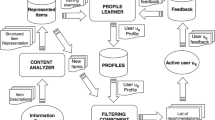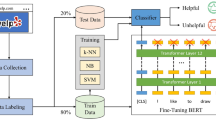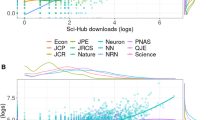Abstract
With the continuous deepening of academic research in various disciplines and the continuous increase in the number of scientific researchers, exploring the mechanism of matching scientific research results and academic journal subjects is a key topic that can assist researchers in selecting suitable journals for submission. The classification and recommendation of academic journals based on a traditional text representation model cannot take advantage of the semantic relationship between words and cannot take into account the diversity of topics received by different journals, which affects the classification and recommendation effect. To solve these problems, this paper uses doc2vec to perform distributed representation of the bibliographic text so that the semantics between the text features are fully preserved. Then, the XGBoost algorithm is used to consider the impact of the different characteristics of the title, abstract, and keywords of the bibliography on the published journal. The academic journal submission recommendation model proposed in this paper can solve the problem that traditional methods cannot make full use of the contextual semantic information and improve the efficiency of scientific research personnel's academic achievement publications. Experiments on Common SCI English journals in the computer field show that when recommending three candidate journals, the accuracy rate reached 84.24%.






Similar content being viewed by others
References
Chaiwanarom, P., & Lursinsap, C. (2015). Collaborator recommendation in interdisci plinary computer science using degrees of collaborative forces, temporal evolution of research interest, and comparative seniority status. Knowledge-Based Systems, 7(5), 161–172.
Chen, Z., Xia, F., Jiang, H., Liu, H., & Zhang, J. (2015). AVER: random walk based academic venue recommendation. In Proceedings of the 24th International CONFERENCE on World Wide WEB (WWW'15) (pp. 579–584). https://doi.org/10.1145/2740908.2741738
Chen, X., Zhao, H. J., Zhao, S., Chen, J., & Zhang, Y. P. (2019). Citation recommendation based on citation tendency. Scientometrics, 121(2), 937–956. https://doi.org/10.1007/s11192-019-03225-6
Dawen, L., Laurent, C, James, M., & David M. (2016). Modeling user exposure in recommendation. In Proceedings of the 24th International Conference on World Wide Web (WWW'16) (pp. 951–961). https://doi.org/10.1145/2872427.2883090.
Feng, X., Zhang, H., Ren, Y., Shang, P., Zhu, Y., Liang, Y., & Xu, D. (2019). The deep learning-based recommender system “Pubmender” for choosing a biomedical publication venue: Development and validation study. Journal of Medical Internet Research, 21(5), 27–35. https://doi.org/10.2196/12957
Hiep, L., Tin, H., Gauch, S., Loc, D., & Kiem, H. (2012). Publication venue recommendation using author network’s publication history. Intelligent Information and Database Systems, 7(1), 426–435.
Huang, W., Wu, Z., Liang, C., Mitra, P., & Giles, C. L. (2015). A neural probabilistic model for context based citation recommendation. In Proceedings of the 29 AAAI Conference on Artificial Intelligence (pp. 2404–2410).
Huynh, T., & Hoang, K. (2012). Modeling collaborative knowledge of publishing activities for research recommendation. Computational Collective Intelligence: Technologies and Applications, 7(6), 41–50.
Kong, X. J., Jiang, H. Z., Yang, Z., Xu, Z. Z., Xia, F., & Tolba, A. (2016). Exploiting publication contents and collaboration networks for collaborator recommendation. PLoS ONE, 11(2), 246–261.
Liang, D., Charlin, L., McInerney, J., & Blei, D. M. (2016). Modeling user exposure in recommendation. In Proceedings of the 25th International Conference on World Wide Web, International World Wide Web Conferences Steering Committee (pp. 951–961).
Liu, H. F., Kong, X. J., Bai, X. M., Wang, W., Bekele, T. M., & Xia, F. (2015). Context-Based Collaborative Filtering for Citation Recommendation. Ieee Access, 32(3), 1695–1703. https://doi.org/10.1109/access.2015.2481320
Luong, H., Huynh, T., Gauch, S., et al. (2012). Publication venue recommendation using author network's publication history. In Proceedings of the 4th Asian conference on Intelligent Information and Database Systems(ACIIDS'12) (pp. 426–435). https://doi.org/10.1007/978-3-642-28493-9_45
Paccanaro, A., & Hinton, G. E. (2001). Learning distributed representations of concepts using linear relational embedding. Ieee Transactions on Knowledge and Data Engineering, 13(2), 232–244. https://doi.org/10.1109/69.917563
Pradhan, T., Gupta, A., & Pal, S. (2020). HASVRec: A modularized Hierarchical Attention-based Scholarly Venue Recommender system. Knowledge-Based Systems, 11(6), 204–226. https://doi.org/10.1016/j.knosys.2020.106181
Pradhan, T., & Pal, S. (2020). CNAVER: A content and network-based academic VEnue Recommender system. Knowledge-Based Systems, 12(24), 189–208. https://doi.org/10.1016/j.knosys.2019.105092
Schuemie, M. J., & Kors, J. A. (2008). Jane: Suggesting journals, finding experts. Bioinformatics, 24(5), 727–728. https://doi.org/10.1093/bioinformatics/btn006
Silva, T., Ma, J., Yang, C., & Liang, H. (2015). A profile-boosted research analytics framework to recommend journals for manuscripts. Journal of the Association for Information Science and Technology, 66(1), 180–200. https://doi.org/10.1002/asi.23150
Wang, D. H., Liang, Y. C., Xu, D., Feng, X. Y., & Guan, R. C. (2018). A content-based recommender system for computer science publications. Knowledge-Based Systems, 157, 1–9. https://doi.org/10.1016/j.knosys.2018.05.001
Wang, G., He, X., & Ishuga, C. I. (2018). HAR-SI: A novel hybrid article recommendation approach integrating with social information in scientific social network. Knowledge-Based Systems, 14(8), 85–99. https://doi.org/10.1016/j.knosys.2018.02.024
Xia, F., Chen, Z., Wang, W., Li, J., & Yang, L. T. (2014). MVCWalker: Random walk-based most valuable collaborators recommendation exploiting academic factors. Ieee Transactions on Emerging Topics in Computing, 2(3), 364–375. https://doi.org/10.1109/tetc.2014.2356505
Yang, Z., & Davison, B. D. (2012). Venue Recommendation: Submitting your Paper with Style. Internation conference on machine learning and applications (ICMLA 2012) (pp. 681–686). https://doi.org/10.1109/ICMLA.2012.127
Yu, J., Xie, K., Zhao, H. H, & Liu, F. F. (2012). Prediction of user interest based on collaborative filtering for personalized academic recommendation. Internation conference on computer science and network technology (ICCSNT 2012) (pp. 584–588). https://doi.org/10.1109/ICCSNT.2012.6526005
Yu, S., Liu, J. Y., Yang, Z., Chen, Z., Jiang, H. Z., Tolba, A., & Xia, F. (2018). PAVE: Personalized Academic Venue recommendation Exploiting co-publication networks. Journal of Network and Computer Applications, 10(4), 38–47. https://doi.org/10.1016/j.jnca.2017.12.004
Acknowledgements
This article is under Grant of The National Social Science Fund of China (No.18CTQ033).
Author information
Authors and Affiliations
Corresponding author
Rights and permissions
About this article
Cite this article
ZhengWei, H., JinTao, M., YanNi, Y. et al. Recommendation method for academic journal submission based on doc2vec and XGBoost. Scientometrics 127, 2381–2394 (2022). https://doi.org/10.1007/s11192-022-04354-1
Received:
Accepted:
Published:
Issue Date:
DOI: https://doi.org/10.1007/s11192-022-04354-1




